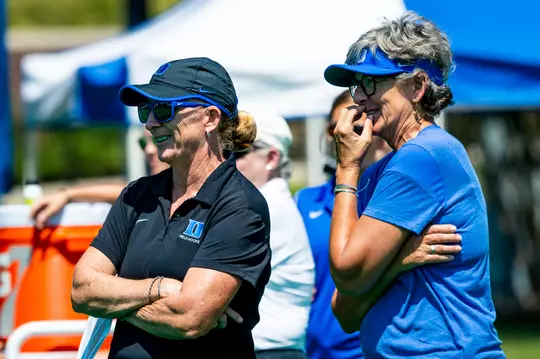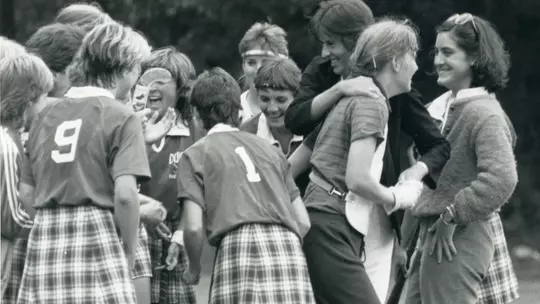
The Trailblazing Silar Set for Duke Hall of Fame Induction
All of you know Jacki Silar. Whether she was your head coach, your sport supervisor or your basketball class instructor, her name is synonymous with Duke Athletics and especially Duke women’s athletics.
So, when Duke announced its Hall of Fame Class of 2022 this past summer, it was no surprise to see Silar’s name among the list of all-time great Blue Devils selected for induction.
However, for Silar it had to be a joke. With Director of Athletics Nina King on the other end of the phone, she just knew King was pulling her leg. After a minute or so the reality set in and the emotions of the moment took over.
“I thought she was fibbing to me. I thought she was kidding with me. I think I said ‘What!? Get out! Why me?’ There are so many great administrators and coaches and everything. I was very very surprised, humbled and just really taken aback. I kept saying ‘What are you talking about?’ I was surprised and very humbled that I would even be considered. I didn’t faint, but I had to sit down for a moment.”Jacki Silar when Nina King called her with the news of her induction into the Duke Hall of Fame
“I thought she was fibbing to me,” said Silar when King called her with the news. “I thought she was kidding with me. I think I said ‘What!? Get out! Why me?’ There are so many great administrators and coaches and everything. I was very very surprised, humbled and just really taken aback. I kept saying ‘What are you talking about?’ I was surprised and very humbled that I would even be considered. I didn’t faint, but I had to sit down for a moment.”
Duke had the benefit of having 41 years with Silar helping lead the charge for women in Duke Athletics. Looking around now and seeing the weight rooms, locker rooms, the gear and all the services available to Duke’s women’s teams and it’s easy to forget those who got the ball rolling – the Jacki Silars of the world.
Silar joined the Duke Athletics staff September 1, 1979, as a women’s basketball assistant coach alongside head coach Debbie Leonard. After two seasons on the sidelines with Leonard, an opening came about on a field on the other side of campus.
Cathy Ennis, the part-time field hockey coach who also worked in Duke’s Physical Education Department, was moving on and the ever competitive and driven Silar was looking for “something else” to go along with her basketball duties.
She was already involved in field hockey as she and Leonard both were officiating field hockey. They’d drive up to Appalachian State or over to Salem College and officiate their games. However, she understood that was not her strength and she wanted to play to her strengths.
“I was officiating field hockey at that time, and I was a horrible official. I did not like it. Debbie [Leonard] would be on the other side saying, ‘Didn’t you see that!?’ I would say ‘Don’t blow your whistle in my area!’ She would respond with ‘Well you totally missed that!’ And it was because I did not like to officiate, I’d rather coach. So, I thought coaching might be better than officiating. Hang up the stripes.”
Knowing Duke needed a coach, Silar approached Leonard, who quickly gave her the go-ahead. They took the idea to Director of Athletics Tom Butters, and he was fully on board as well. After all, it was one fewer coach he had to hire and pay in what was the early years of women’s college sports.
The Blue Devils’ field in 1981 was on East Campus, where it still resides today, but it was a grass field behind the current Jack Katz Stadium. Leaves falling on the field were a problem, but that large oak tree was a staple to Duke’s campus, and it wasn’t going anywhere. Mowing the field was not a top priority either, but the student-athletes and Silar soldiered on.
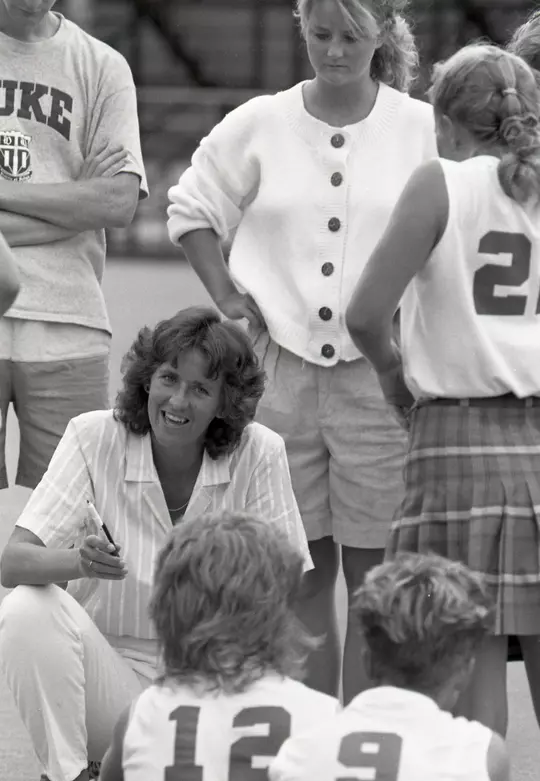
When it came to the personnel, Silar inherited a veteran field hockey squad. The program was in its 11th season and the NCAA hadn’t been formed yet as women’s sports were still competing in the AIWA – Association for Intercollegiate Athletics for Women.
A successful college athlete herself, playing basketball and field hockey at High Point, Silar brought a new intensity to the Blue Devils squad. Change is hard and that first season certainly offered its share of challenges as Silar put in place what she thought was best for the seasoned group.
“They were all telling me I play here, and I play here,” Silar said. “I play right back, I play at the left fullback and so on,” Silar said. “I nodded and said ‘That’s good. We’ll see how it goes.’ I remember my first group being an outstanding group of young women. They were fantastic women, but we ran more, and I conditioned them more than they did [with the previous coach]. So, I remember there were some challenges in the very beginning.”
But the players and Silar quickly adapted to each other and came together because they all shared the same goal – to be excellent.
In Silar’s first of what would be 15 seasons, the Blue Devils finished 8-7-1. The next season ran like a well-oiled machine as Duke battled its way to a 14-6 overall record, and in 1983 ACC field hockey made its debut. Duke finished 1-1 in league action that year and seven years later in 1990, the Blue Devils captured a share of the regular season crown for the first time. Silar garnered the first of her two ACC Coach of the Year awards that season for her efforts.
In 1992, Silar and the Blue Devils registered another program-first, earning an NCAA Tournament berth and advancing to the quarterfinals. Silar went on to coach three more seasons, before stepping into an administrative role as Duke’s first senior woman administrator in 1995.
We would be remiss if we didn’t remind you that she did all this while also serving as an assistant coach for the women’s basketball team, which advanced to the NCAA Tournament in 1987 and had its first All-American in Chris Moreland one year later.
“I thought I could do both,” Silar said about working with both teams. “I don’t know how good I was at both, but I had fun going from hockey practice to basketball practice for multiple years.
The transition away from the sidelines allowed Silar to have more time to lend her expertise and support to many other Blue Devil programs as a primary sport supervisor. Silar, like she did everything, took on this new role with gusto, developing relationships with coaches, athletes and staff members.
“You deal with great student-athletes, you deal with great staff,” Silar said. “We have great people at Duke and every day I came to work I enjoyed what I did. Nobody ever worked for me. I worked with people, and I always said that.”
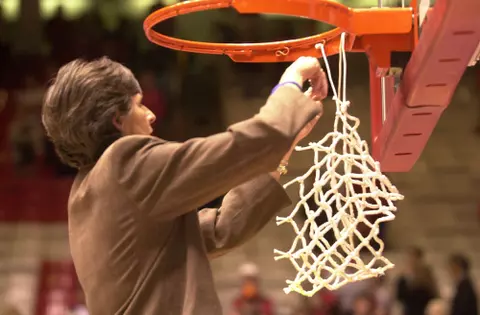
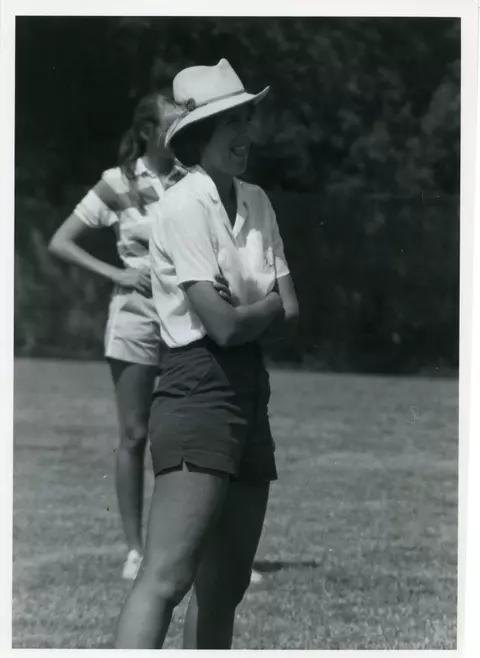
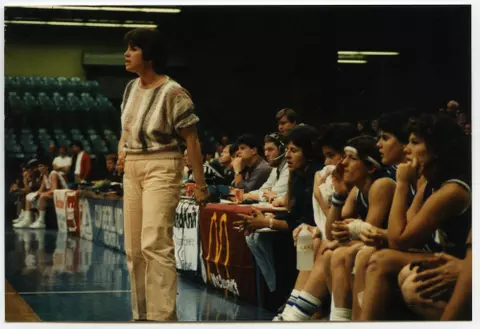
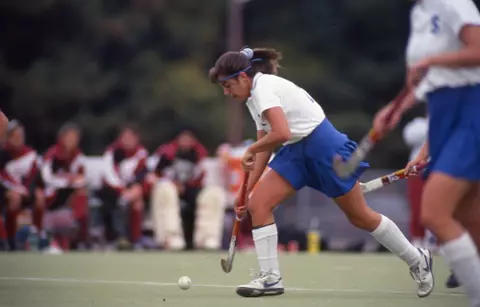
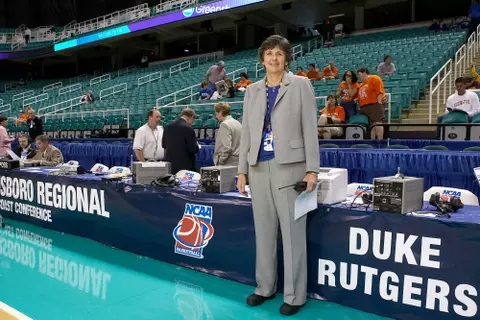
Over the course of her time in athletics administration, Silar served the ACC and NCAA in various capacities, including serving as the Chair of the NCAA Division I Women’s Basketball Committee in 2008-09. She also served as the Chair of the NCAA Division I Field Hockey Committee for two years in the early 90s.
Throughout the years, Silar worked with a total of 24 head coaches across 15 different sports. She interacted with and developed bonds with countless student-athletes, witnessing exhilarating victories and gut-wrenching losses all while playing a crucial role in helping these young men and women grow into outstanding adults.
Silar cherished being a part of student-athletes’ lives over the course of her incredible career. She saw them arrive on campus as wide-eyed 18-year olds and emerge as exceptional young adults who would achieve so much in all facets of life.
“I don’t have children of my own, but I have a lot of children,” Silar said. “I don’t have grandchildren, but I have a lot of grandchildren. I’m so proud of everyone, every time they accomplish something, every time they have a child, every time their child then comes to Duke, and I get to coach them in my basketball class. It’s exciting. It’s so rewarding to feel like I was a very very very small part of their life. Whatever small part I could help them with – I’m sure I didn’t help everybody, but I feel like I was a small part of it. I’m so proud of them all. Everybody has accomplished something in their life, whether big or small.”
Those whom Silar provided mentoring need to know the inverse was true. They were a large reason she continued to work in college athletics for as long as she did. The desire and dedication to being great that embodies the Duke student-athlete pushed Silar into staying connected and energized in a fast-changing sports landscape.
“[They are] driven academically and athletically and sometimes driven too much socially,” Silar smiled coyly when talking about her experience with Duke student-athletes. “They come in and they kind of know what they want. They kind of know their path. That was not everybody, but that’s the majority of student-athletes I dealt with, whether it was field hockey, basketball or just having oversight of different sports or being an academic advisor for just Duke students in their freshmen and sophomore years.”
Silar and these young women and men were on the same page. They all wanted to be the best at whatever it was they were doing and that’s something she shared with parents every chance she got.
“I always told recruits and their parents that Duke is about excellence, both in the classroom, on the playing field, wherever it is, it’s about excellence,” Silar said. “And that’s what we strive for at Duke and that’s what I always strive for. Be the best you can be. Put it all out there.”
For Silar, there were points she wasn’t positive she still wanted to “put it all out there,” as she contemplated an early retirement. Fortunately for Duke, there was a person who kept her going. Someone who, not only provided a close friendship, but also offered incredible mentorship to Silar in many of those challenging times.
Greg Dale, Duke’s preeminent Director of Sports Psychology and Leadership Program, worked tirelessly with Silar as she spearheaded Duke’s student-athlete development division along with leadership programming. With Silar at the forefront to start, the quartet of Leslie Barnes, Scott Yakola and Dale collaborated to develop a space where athletes learn to use their voice and develop leadership skills as they prepare for the next chapter in their lives.
“[Greg was] one person who kept me going at the end when I thought about retiring very early. Greg Dale, my buddy Greg Dale. He kept me going through the last couple of years of my life at work. I have to give him credit. He’s my buddy. He gets credit because he’s what kept me going in those final years.”Jacki Silar
“[Greg was] one person who kept me going at the end when I thought about retiring very early,” Silar said. “Greg Dale, my buddy Greg Dale. He kept me going through the last couple of years of my life at work. I have to give him credit. He’s my buddy. He gets credit because he’s what kept me going in those final years.”
So, thank you to Greg Dale for allowing us more time with Jacki Silar. We are all better off for it.
